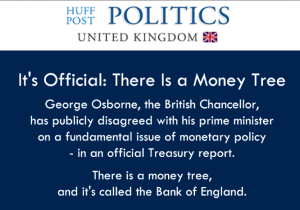It's Official: There Is a Money Tree

George Osborne, the British Chancellor, has publicly disagreed with his prime minister on a fundamental issue of monetary policy – in an official Treasury report, reads an article in Huffington Post on 24th March 2013, written by Ann Pettifor, Director of PRIME Policy Research in Macroeconomics.
Here is a short extract:

The prime minister recently argued that “There’s no magic money tree” to fund what he called “this ever more wishful borrowing and spending”.
But his Chancellor, George Osborne, disagrees.
The disagreement is aired in one of the documents tabled by the Chancellor on budget day. It’s titled: “Review of the Monetary Policy Framework.” – and is tucked away in the bundle of documents issued last Wednesday.
In paragraph 3.34, the Treasury makes plain that the monetary authorities could finance increased government spending on infrastructure “through the creation of money“.
There is a money tree, and it’s called the Bank of England.
Here is how the Chancellor explains Bank of England financing of public investment in his Review of the Monetary Policy Framework:
“central banks could go beyond the range of unconventional instruments deployed … in advanced economies since the 2008-09 financial crisis. For example, it is theoretically possible for monetary authorities to finance fiscal deficits through the creation of money. In theory, this could allow governments to increase spending or reduce taxation without raising corresponding financing from the private sector.”
You can read the whole article here.